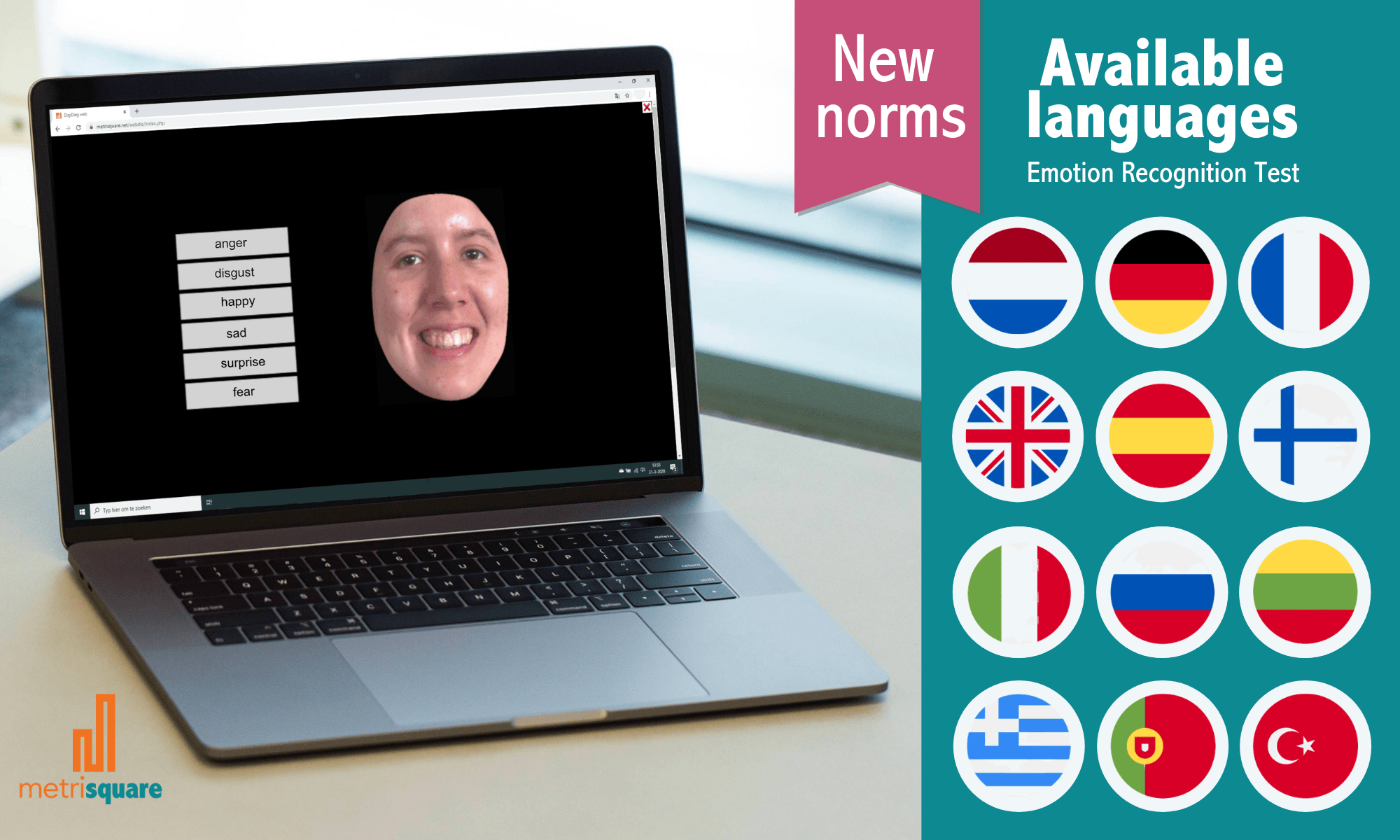Emotion Recognition Task
Evidence-based emotion recognition test
During the Emotion Recognition Task (ERT), images of faces gradually change from neutral to a particular emotion. The client is asked to recognise the emotion. The test was developed by Barbara Montagne, Roy Kessels, David Perrett and Edward de Haan. The authors published the test on the Metrisquare platform DigiDiag, and is free when used scientifically.
Standards based on regression are available from a sample of 418 healthy participants from the Netherlands, Ireland, Germany and Australia aged 8-88 years. New norms have been available since 2020 (Updated normative data 2020 18-88 (n=255))
Data from individual participants are stored at the level of each trial for research purposes. An aggregated PDF report per person is also generated, showing the individual’s performance as a percentile for each emotion, as well as the total score. The ERT is available in Dutch, English, German, French, Spanish, Italian, Portuguese, Turkish, Finnish, Lithuanian and Russian. Another language can easily be selected via the test. Would you like to obtain the test in another language? Then please contact us.
Request the ERT
The ERT is a free test, you only pay for the platform and the connection fee. If you choose the clinical version, you can take advantage of our services that ensure the instrument can be used safely for clinical purposes in a healthcare facility.

ERT for Research on Dementia
Metrisquare has partnered with the Centre for Healthy Brain Ageing (CHeBA) at University of New South Wales Sydney in Australia to deliver an online tool to assess social cognition.
Even though social cognition is often affected in dementia, it is less well understood than memory and executive function. There are expected age-related changes in social cognition in healthy and cognitively normal older adults but the extent to which this varies is not clear.
Work at CHeBA seeks to ascertain what can be considered normative social cognitive functioning in older adults, what changes are attributable to normal age-related changes, and if early changes in social cognitive function can serve as a marker of cognitive decline and predict future onset of dementia. By assessing social cognition in older Australian twins, researchers at CHeBA will also examine the extent to which social cognition and changes in social cognition are determined by genetics and our environment.
Social perception, which is the gathering and detection of social cues from one’s environment to assess a situation, is a subdomain of social cognition. The most salient example of this is emotion recognition, particularly through facial expressions and tone of voice.
While dementia is associated with outright impairments in correctly identifying certain facial expressions of emotions, it is likely that this impairment has a gradual onset, and that milder forms of cognitive impairment is associated with slight impairments in recognizing emotions at an incremental level.
For this reason, CHeBA decided to use the Emotion Recognition Task (ERT) hosted on the Metrisquare platform to quantify this skill. The ERT assesses participants on their accuracy in identifying the six basic emotions (anger, fear, disgust, happiness, sadness, surprise) at various intensities (20%, 40%, 60%, 80%, 100%) and allows the researchers to better map out more subtle differences and changes in emotion recognition ability. The ERT has been validated in numerous other clinical groups, including autism spectrum disorders, frontotemporal dementia, and Alzheimer’s disease.
CHeBA’s vision is to achieve, through research, healthier brain ageing and better clinical care of age-related brain diseases. Metrisquare is proud to partner with them in this endeavour.

Text written and approved by: (left) Vibeke Catts, Study Coordinator Older Australian Twins Study (OATS) and (right) Russell Chander, Scientia PhD Scholar, at CHeBA, UNSW Sydney.
Assessment of perception of morphed facial expressions using the Emotion Recognition Task (ERT): Normative data from healthy participants aged 8-75
Kessels, R.P.C., Montagne, B., Hendriks, A.W., Perrett, D.I, & De Haan, E.H.F. (2014). Journal of Neuropsychology, 8, 75-93. https://bpspsychub.onlinelibrary.wiley.com/doi/10.1111/jnp.12009
De Emotion Recognition Task (ERT): Een test om de perceptie van emotionele gezichtsuitdrukkingen te meten
Kessels, R.P.C. & Montagne, B. (2017). Tijdschrift voor Neuropsychologie, 2, 181 – 194. Amsterdam: Boom Testuitgevers. https://www.tvnp.nl/inhoud/tijdschrift_artikel/NP-11-2-06/De-Emotion-Recognition-Task-ERT-Een-test-om-de-perceptie-van-emotionele-gezichtsuitdrukkingen-te-meten
![ERT authors [Barbara Montagne, Roy Kessels, Edward de Haan and David Perrett] group photo of the ERT authors; Barbara Montagne, Roy Kessels, Edward de Haan and David Perrett](https://www.emotionrecognitiontask.com/wp-content/uploads/2023/07/final-ERT-authors-Barbara-Montagne-Roy-Kessels-Edward-de-Haan-and-David-Perrett.png)
Get in touch
Metrisquare also offers RSP. With RSP, you can effortlessly administer, score and report psychological tests. Manual calculations and searching are a thing of the past thanks to RSP’s digital support for scoring psychological tests. This not only saves time, but also minimises the risk of errors. Moreover, RSP uses original norm data as published by publishers and in leading professional literature.

